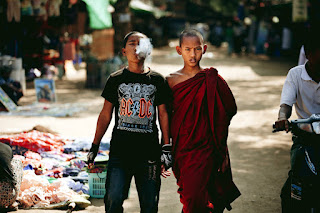Bodhisattva Vow by
Adam Yauch (deceased
Beasty Boy)(1994)
As I Develop The Awakening Mind I Praise The Buddha As They Shine
I Bow Before You As I Travel My Path To Join Your Ranks,
I Make My Full Time Task
For The Sake Of All Beings I Seek
The Enlighted Mind That I Know I'll Reap
Respect To
Shantideva And All The Others
Who Brought Down The Dharma For Sisters And Brothers
I Give Thanks For This World As A Place To Learn
And For This Human Body That I'm Glad To Have Earned
And My Deepest Thanks To All Sentient Beings
For Without Them There Would Be No Place To Learn What I'm Seeing
There's Nothing Here That's Not Been Said Before
But I Put It Down Now So I'll Be Sure
To Solidify My Own Views And I'll Be Glad If It Helps
Anyone Else Out Too
If Others Disrespect Me Or Give Me Flack
I'll Stop And Think Before I React
Knowing That They're Going Through Insecure Stages
I'll Take The Opportunity To Exercise Patience
I'll See It As A Chance To Help The Other Person
Nip It In The Bud Before It Can Worsen
A Change For Me To Be Strong And Sure
As I Think On The Buddhas Who Have Come Before
As I Praise And Respect The Good They've Done
Knowing Only Love Can Conquer In Every Situation
We Need Other People In Order To Create
The Circumstances For The Learning That We're Here To Generate
Situations That Bring Up Our Deepest Fears
So We Can Work To Release Them Until They're Cleared
Therefore, It Only Makes Sense
To Thank Our Enemies Despite Their Intent
The Bodhisattva Path Is One Of Power And Strength
A Strength From Within To Go The Length
Seeing Others Are As Important As Myself
I Strive For A Happiness Of Mental Wealth
With The Interconnectedness That We Share As One
Every Action That We Take Affects Everyone
So In Deciding For What A Situation Calls
There Is A Path For The Good For All
I Try To Make My Every Action For That Highest Good
With The Altruistic Wish To Achive Buddhahood
So I Pledge Here Before Everyone Who's Listening
To Try To Make My Every Action For The Good Of All Beings
For The Rest Of My Lifetimes And Even Beyond
I Vow To Do My Best To Do No Harm
And In Times Of Doubt I Can Think On The Dharma
And The Enlightened Ones Who've Graduated Samsara
[end]
(The capitals for the words is just from the website I found the lyrics. They didn't spell Dharma right once, I corrected that.)
Rereading it, I think that's pretty awesome, a fair modern statement of the
Bodhisattva Vow. I could see chanting that. Better yet, create my own.
I found out about the song from Shambhala SunSpace, the blog of the Shambhala Sun. Unfortunately, I didn't take
Hip Hop seriously until a while after the song came out, so I've just found the song. Listening to the song on
spotify, I agree with a comment that it's a bit hard to understand, not easy to distinctly hear.
Wikipedia says, "Yauch was a practicing Buddhist. He became an important voice in the Tibetan independence movement. He created the Milarepa Fund, a non-profit organization devoted to Tibetan independence, and organized several benefit concerts to support the cause, including the Tibetan Freedom Concert."
Also, "In 1995, while attending a speech by the Dalai Lama at Harvard University, he met his wife, Tibetan American Dechen Wangdu. They married in 1998 and also had a daughter, Tenzin Losel, in the same year."
Here is an interview of Adam Yauch from Shambhala Sun.
(BTW on Spotify (in USA), when you search Bodhisattva Vow, you also get a decent song by
Alex Walsh, and, I listened to his album Master and Disciple, which is folk music with many Buddhist themes. He seem to have
Nichiren influences. Pretty cool.
There's also a "classically trained" pianist, Carol Colacurcio, who has as song of that title too.)



















.JPG)
.JPG)




